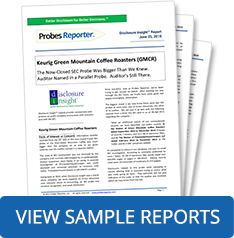Whether or not you agree with the Foreign Corrupt Practices Act, it is the law here in the US and violating the same can get you in trouble. If you're one of the many inclined to quickly dismiss, or even pooh-pooh FCPA investigations as little more than "nuisances" posing no real harm to investors, you are misinformed.
Based on documents we acquired under the Freedom of Information Act, we now know the direction taken by the SEC when it conducts FCPA investigations. They are primarily focused on accounting and internal controls, and typically include scrutiny of the following --
- What was the accounting treatment used for the bribe(s)?
- Who signed off on it?
- What does covering-up a bribe say about the adequacy of internal controls?
- What’s your auditor likely to say when they find out?
If telling you an FCPA probe is essentially an investigation into a company's accounting and controls wasn't enough to convince you to take them seriously, than ask yourself this very important question --
- For those who engaged in the practice, now forced to stop, what happens to a public company's capacity to conduct business if bribing people is no longer an option?
We recommend investors take FCPA investigations more seriously than is typically the case today. Even long after regulators are gone, they can cause long-term harm to a company's capacity to deliver on revenue and earnings expectations.

